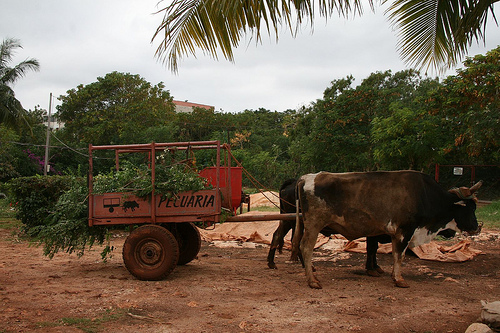
This Photo by Unknown Author is licensed under CC BY-NC-SA
Much has been written about Cuba’s shift from industrialized to organic farming after the fall of the Soviet Block in 1989. During this Special Period, with no ability to import equipment or fertilizer, Cuba installed community gardens throughout its urban areas, and rural communities returned to the ‘ways of the campesino’ (Cuba: The Accidental Revolution, 2007). As the world considers threats to global food security, some wonder: Is the Cuban model the answer?
Yes and no.
While, Cuba’s experience suggests it’s possible for communities to feed themselves without petroleum, several factors must be considered:
- Cuba’s climate supports significant biodiversity and a year-round growing season, in stark contrast to arid regions in Africa, Asia, the Middle East, where arable land and water are under pressure (Brown, chapters 5 and 6).
- Even climate can’t guarantee thriving agriculture. Look no further than Cuba’s neighbor, Haiti. Both countries contend with punishing tropical storms but in Haiti, deforestation has led to a near complete loss of topsoil. Poverty and weak government work in tandem with weather to create a reinforcing cycle that stymies restoration.
- As early as 1959, the Cuban government sustained efforts to ‘link people to the land,’ incorporating agriculture into education and encouraging Cubans to ‘volunteer’ on countryside farms. It invested in agricultural research and supported exchange between scientists and farmers to both share new methods and ‘recuperate’ knowledge of traditional ones. In Havana, it sanctioned an already extensive network of neighborhood organizations to farm on public land (Rosset and Benjamin, pp. 27-28, 70-77).
- Without fertilizer or oil to transport food, Cubans had no choice but to shift to labor-intensive, organic, seasonal eating.
The latter is perhaps the most important point to consider, because Cuba eventually identified a new source of oil and did not, in fact, achieve long-term food sovereignty. It now trades medical and scientific expertise for Venezuelan oil and according to the WFP imports 70 to 80 percent of its food.
This isn’t to say we shouldn’t try to learn from Cuba. On the contrary, as we face ‘peak everything,’ accelerating the shift from industrialized, monoculture farming is imperative. The true key, however, will lie in collective agreement that our ecological predicament leaves us no choice but to institute geography-specific agricultural, technological, economic, and political reforms.
